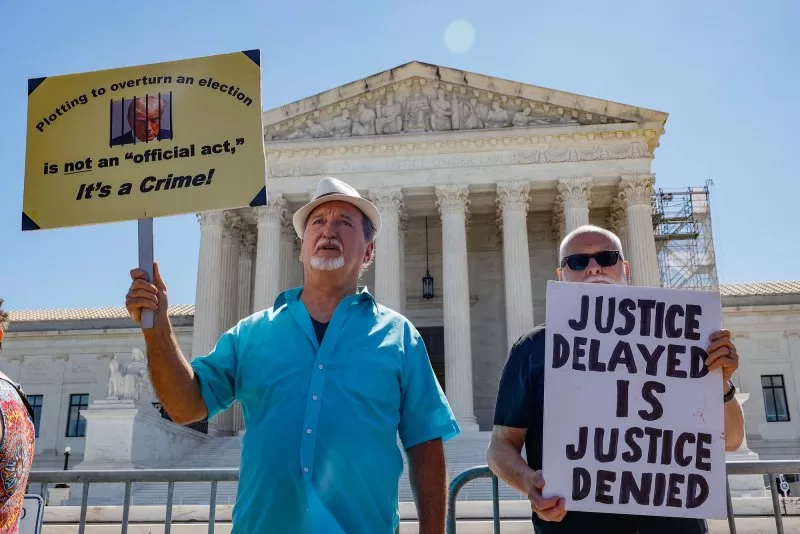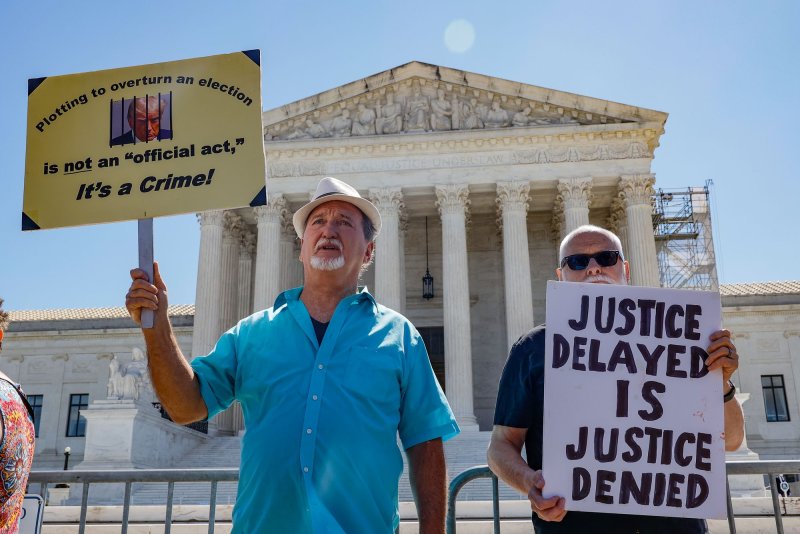1 of 5 | Gary Roush and Bill Christeson hold up signs outside of the Supreme Court prior to the courts decision to grant former president Donald Trump limited immunity in his Jan. 6 case at the U.S. Supreme Court on Monday. Photo by Jemal Countess/UPI |
License PhotoJuly 1 (UPI) — The U.S. Supreme Court ruled that former President Donald Trump has some immunity for official acts on Monday.
The court ruled 6-3 that Trump has absolute immunity in executing his core constitutional powers, such as the appointment of ambassadors. He also has a presumption of immunity for official acts related to his role as president. However he does not enjoy immunity for unofficial acts.
The ruling was split on conservative and liberal lines.
Chief Justice John Roberts, writing the majority opinion, said it is up to the lower courts to determine whether Trump’s alleged acts were official or unofficial.
“Despite the unprecedented nature of this case, and the very significant constitutional questions that it raises, the lower courts rendered their decisions on a highly expedited basis,” Roberts wrote. “Because those courts categorically rejected any form of presidential immunity, they did not analyze the conduct alleged in the indictment to decide which of it should be categorized as official and which unofficial.”
Roberts adds that the high court has little precedent to rely upon in determining a president’s immunity.
“That is because proceedings directly involving a President have been uncommon in our nation,” he wrote.
The court did offer some guidance to the lower courts as they revisit the question of Trump’s immunity claim. Roberts wrote that Trump’s discussions with the acting attorney general are “readily categorized in light of the nature of the president’s official relationship to that office,” indicating it is an official act.
How a court should determine Trump’s attempts to influence Vice President Mike Pence, state officials and others to reject or overturn the results of the election is not so clear.
Roberts acknowledged that Trump’s immunity claim is “far broader” than what the court recognizes.
Justice Sonia Sotomayor, joined in her dissenting opinion by Justices Elena Kagan and Ketanji Brown Jackson, said the ruling “reshapes the institution of the presidency.”
“It makes a mockery of the principle, foundational to our Constitution and system of government, that no man is above the law,” Sotomayor wrote. “Relying on little more than its own misguided wisdom about the need for ‘bold and unhesitating action’ by the president the court gives former President Trump all the immunity he asked for and more. Because our Constitution does not shield a former President from answering for criminal and treasonous acts, I dissent.”
Trump’s defense argued that the former president has “absolute immunity,” shielding him from prosecution on four charges in the Washington election interference case. This immunity applies to official acts in the role of president, though defense attorneys applied this more broadly to any actions taken by Trump while he was president.
A ruling in Trump’s favor, they believed, would have had the case tossed out. Monday’s opinion did not do that. Instead, it further delayed the trial proceedings as the lower courts to consider what acts by Trump are official.
Monday is the final opinion day on the high court’s calendar before being released for summer break.
Trump is charged with conspiracy to defraud the United States, witness tampering, conspiracy against the rights of citizens and obstruction of and attempt to obstruct an official proceeding. These charges related to his role in attempting to stop the certification of the 2020 presidential election and the Jan. 6 riot at the Capitol.
U.S. District Judge Tanya Chutkan shot down Trump’s immunity claim in the Washington case before the argument was taken to appeals. Chutkan has since put the case on hold while waiting for the high court’s opinion.
The case was originally set to go to trial on March 4.
Defense attorney John Sauer also made the argument before the D.C. Circuit Court of Appeals that Trump must be impeached and convicted before he can be prosecuted.
Special counsel Jack Smith and other government prosecutors contend that no such immunity exists that would shield a former president from charges of fraud, obstruction and denying votes. Smith added that all presidents face the possibility of liability after leaving office.
“Since Watergate, the Department of Justice has held the view that a former president may face criminal prosecution, and independent and special counsels have operated from that same understanding,” Smith wrote in an April filing to the Supreme Court. “Until petitioner’s arguments in this case, so had former presidents.”

